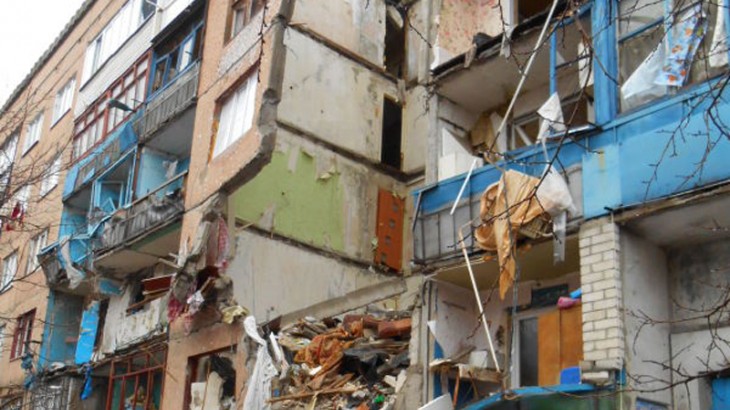Ukraine crisis: ICRC calls on all parties to spare civilians

Fighting has intensified recently in and around Donetsk, resulting in civilian casualties and preventing the ICRC team in Donetsk from carrying out its humanitarian work.
"We once again call on all parties to refrain from harming civilians and to comply with international humanitarian law," said Michel Masson, head of the ICRC delegation in Ukraine. "In particular, we remind them that indiscriminate attacks are prohibited. We are deeply concerned about the escalation of violence in eastern Ukraine over the past two weeks. The tragic death of civilians in a bus near Volnovakha in the Donetsk region on 13 January is one of many incidents that highlight the unacceptable situation in which ordinary people find themselves."

Ukraine. A mother displaced by the fighting collects food for her family. [CC BY-NC-ND / ICRC / M. Dondyuk]
Harsh winter conditions and the suspension of benefit payments in some parts of the Donetsk and Lugansk regions are making the situation even more difficult. The ICRC is distributing food, hygiene items, medical supplies and construction materials to both residents and displaced persons in the Lugansk and Donetsk regions, working in close cooperation with the Ukrainian Red Cross and the local authorities.
The ICRC is conducting humanitarian visits to people held in places of detention run by the Ukrainian authorities in Zaporizhia, Odessa, Poltava, Kharkiv, Mariupol and Kiev.
On 15 January, ICRC teams also started to visit people held in prisons in Donetsk, which are not under the control of the Ukrainian authorities. This is the first time that the ICRC has visited such facilities since it started operations in Ukraine.
The purpose of the ICRC's detention visits is to monitor the treatment of the detainees and their conditions of detention, including the availability of food and medication. The ICRC visits people detained in connection with conflict and violence all over the world.

Ukraine. An ICRC employee offloads a consignment of insulation that will be used to repair buildings damaged by fighting. [CC BY-NC-ND / ICRC / M. Dondyuk]
Between October 2014 and January 2015, the ICRC:
- delivered more than 2,000 tonnes of aid to areas not controlled by the Ukrainian government in the Donetsk and Lugansk regions, including food, hygiene items, medical supplies, blankets and tarpaulins;
- provided food and other items to more than 45,000 people in the Donetsk and Lugansk regions, including both local residents affected by the conflict and displaced people;
- delivered roofing materials and tools to the municipal authorities, to enable much-needed repairs to public and residential buildings damaged by shelling;
- provided wound-dressing materials, surgical items, blood-transfusion sets, insulin, other medicines and other medical supplies for the treatment of people wounded in the hostilities and of internally displaced persons to 45 hospitals in the Donetsk and Lugansk regions, including those in Donetsk and Mariupol;
- issued vouchers to displaced people in Kharkiv and Mariupol through the Ukrainian Red Cross Society. As of January 2015, around 35,000 people had received vouchers, each of them worth 200 Ukrainian hryvnas (a little over 15 US dollars).
- helped Red Cross branches in Crimea to distribute food parcels, hygiene items and other supplies to 10,000 displaced people;
- helped Red Cross branches in Krasnodar, Adygea and the northern Caucausus to distribute food parcels, hygiene items and other supplies to 11,000 displaced people;
- funded vouchers that the Belarus Red Cross is distributing in Belarus, which will enable 3,000 displaced people to buy food and other essentials.
For further information, please contact:
Ashot Astabatsyan, ICRC Kiev, tel: +380 67 509 42 06
Anastasia Isyuk, ICRC Geneva, tel: +41 22 730 30 23 or +41 79 251 93 02
Victoria Zotikova, ICRC Moscow, tel: +7 495 626 5426 or +7 903 545 3534
